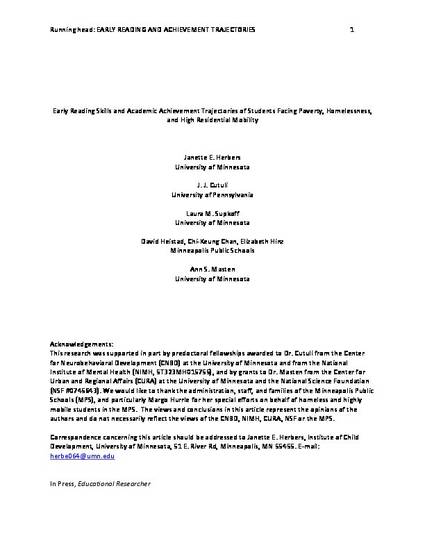
Article
Early Reading Skills and Academic Achievement Trajectories of Students Facing Poverty, Homelessness, and High Residential Mobility
Educational Researcher
(2012)
Abstract
This investigation tested the importance of early academic achievement for later achievement trajectories among 18,011 students grouped by level of socioeconomic risk. Students considered to be at highest risk were those who experienced homelessness or high residential mobility (HHM). HHM students were compared to others eligible for free meals, students eligible for reduced price meals, and students who were neither HHM nor low-income. Socioeconomic risk and oral reading ability in first grade predicted growth of reading and math achievement in grades 3 through 8. Risk status predicted achievement beyond the effects of early reading scores and also moderated the prediction of later growth in reading achievement from early oral reading. Results underscore the early emergence and persistence of achievement gaps related to poverty, high and accumulating risk for HHM students, and the significance of oral reading in first grade, both as an early indicator of risk and also as a potential protective factor.
Keywords
- Homelessness,
- Residential Mobility,
- Academic Achievement,
- Poverty
Disciplines
Publication Date
December, 2012
Citation Information
Janette E. Herbers, J. J. Cutuli, Laura M. Supkoff, David Heistad, et al.. "Early Reading Skills and Academic Achievement Trajectories of Students Facing Poverty, Homelessness, and High Residential Mobility" Educational Researcher Vol. 41 (2012) Available at: http://works.bepress.com/jj_cutuli/12/
